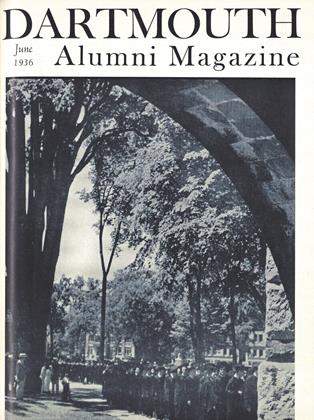By Harold Blodgett Dartmouth College Publications, 1936.
Dartmouth alumni are requested to take on receipt of this MAGAZINE the following examination, and to grade their own papers according to the value of each question noted in parentheses:
(1) What is meant by "primitive alcazar"? (5) (2) When was Dartmouth College founded? (5) (3) What is the college motto? (5) (4) Outline the main points of Eleazar Wheelock's life. (25) (5) Why did Wheelock select New Hampshire? (10) (6) Who was George Whitefield and what part did he play in the founding of Dartmouth? (10) (7) After whom was Dartmouth named? Who was he? (10) (8) Identify Nathaniel Whitaker. (10) (9) Who was Samson Occom? (15) (Five points allowed for neatness.)
Throughout the last five years the editors of the Dartmouth College Manuscript Series have been studying the thousands of letters, charters, and other documents which are housed in the basement of Baker Library, and editing some of the material. In the first volume (The Letters of Elea,7.arWheelock's Indians) I reproduced letters written by the eighteenth century Indians who came under Wheelock's care, with the exception of Occom; in the second volume (An Indian Preacher in England) Professor Richardson told the story of Occom's profitable visit to England to raise money for Wheelock. In the present volume, Professor Harold Blodgett, formerly an instructor in the Department of English, has given a full account of Occom's life, with many of his letters and extracts from his diary. A study of these three volumes will help the alumnus in answering the examination given above.
Professor Blodgett begins his biography with an account of missionary work among the Mohegans, to whom Occom belonged! and follows his introduction with a concise narrative of Occom's training under Wheelock. The author then tells us of Occom's efforts as schoolmaster, his missionary work in the province of New York, his troubles at Mohegan, and his tour of England and Scotland, the high point of his career. Then follow chapters dealing with Occom's personal problems, his sermon at the execution of Moses Paul, and his important part in arranging for the migration of New England Indians to a new home in Brothertown, New York. The final chapters deal with the last years of Occom, his death and its effect on the Indians, and a general characterization of him.
This biography differs from W. Deloss Love's Samson Occom and the ChristianIndians of New England mainly in its clarity and emphasis. Love's account is comparatively uninteresting and tangled; his story doesn't march from chapter to chapter. Professor Blodgett sees the various periods of Occom's life in their proper perspective; we advance easily from one chapter to another. The story is told in an orderly fashion. Furthermore, he has gathered numerous personal details and by means of them has brought to life an important figure in the history of Dartmouth who up to this time has been for many Dartmouth men merely the name of an unimportant pond.
Occom was opposed to Wheelock's use of the money which had been collected abroad; Dartmouth College to him did not fulfill the promise which he and Whi taker had held out to the donors. He never visited Hanover, and could not have seen the primitive alcazar, if it existed. But as Professor Blodgett states, he assisted "unwittingly but powerfully" in establishing Dartmouth. Occom has long deserved such a clearly written and sympathetic biography.
[Reviews of three publications of formermembers of the faculty follow.]
 View Full Issue
View Full Issue
More From This Issue
-
 Article
ArticleSOCIAL SURVEY REPORT
June 1936 By The Editors -
 Class Notes
Class NotesClass of 1935
June 1936 By William W. Fitzhugh Jr. -
 Class Notes
Class NotesClass of 1929
June 1936 By F. William Andres -
 Class Notes
Class NotesClass of 1911
June 1936 By Prof. Nathaniel G. Burleigh -
 Article
ArticleTHE SONS AND DAUGHTERS OF '79
June 1936 By Clifford Hayes Smith -
 Class Notes
Class NotesClass of 1934
June 1936 By Martin J. Dwyer Jr.
James Dow McCallum
Books
-
 Books
BooksShelflife
Sept/Oct 2011 -
 Books
BooksShelf Life
Sep - Oct -
 Books
BooksWILD BIRDS AT HOME
November 1935 By Dr. Frederic P. Lord '98 -
 Books
BooksFACULTY PUBLICATIONS
February, 1923 By JAMES G. STEVENS. -
 Books
BooksPHYSICAL CHEMISTRY FOR STUDENTS OF BIOLOGY AND MEDICINE
June 1933 By John P. Amsden -
 Books
BooksWood Butchers
June 1981 By R. H. R.



